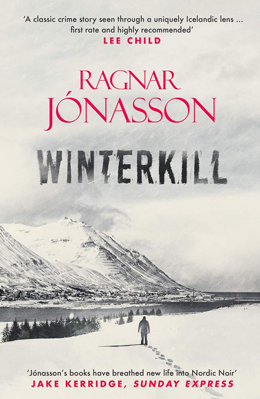With Winterkill, Ragnar Jónasson makes a triumphant return to his Dark Iceland series for one final outing featuring fan-favorite Ari Thor Arason. As with the previous novels in the series – Snowblind, Blackout, Rupture, Whiteout, and Nightblind – Jónasson nails the tone in what I like to call “cozy noir.” These are dark books, in terms of human nature, but they evoke this disturbing worldview without graphic violence or harsh language. If in fact Winterkill is the last readers see of Ari Thor, it’s a fitting conclusion to a powerful series from a writer who is one of the best in today’s crime fiction community.
In many ways, Winterkill is about transformation: the growth that has taken place within Ari Thor, the shift in the relevance of Siglufjörður, and the polishing of Ragnar Jónasson’s writing, itself. Let’s look at each of these in a bit more depth to have a clearer vision of both the crime at the core of Winterkill, but also the levels beneath the surface.
When readers first meet Ari Thor Arason in Snowblind, he is very much an outsider within the community of Siglufjörður. As a result of this mistrust, his investigation suffers, but ultimately he succeeds in discovering the truth. As the series goes on, his relationship with the townsfolk and in particular his superior, Tómas, strengthens which allows his career to flourish. In Winterkill, he has now replaced Tómas (who has relocated to Reykjavik) and his sense of what is happening in the community around him is more finely tuned. Ari Thor has become more confident in his abilities to investigate crime and understand the mind of the criminal. The same cannot yet be said for poor Ari Thor’s personal life. With his estranged wife and son coming to town for the Easter holiday, Ari Thor hopes that he will get some answers regarding their potential future – together or apart. Things get complicated with it turns out an old flame, Ugla, is wrapped up in his current investigation.

A young girl has been found dead on the street outside of a private residence shared by an elderly couple and a historian/teacher. All evidence points to her demise being caused by a fall from the building’s balcony – but did she jump or was she pushed? Ari Thor refuses to make assumptions and as he begins to interview witnesses, as well as the people in this young girl’s life, he discovers more questions than answers. When a resident at the nursing home where she works writes a mysterious message all over his wall, Ugla reaches out to Ari Thor unsure if the two incidents are connected.
Siglufjörður is a smaller, isolated community, but over the course of the series, readers have witnessed it blossom into a tourist destination. In many ways, this makes Ari Thor’s job just a bit more difficult. But for the citizens, the influx of tourist dollars has helped assuage the burdens caused by the collapse of the fishing industry. Ari Thor’s investigation finds him trekking out to Siglunes, the furthest point in Siglufjörður. This particular investigation also brings him back together with some of the townsfolk he has met over the years, including Reverend Eggert. Setting this tale during the period from Good Friday to Easter Monday is no accident – this is a period traditional viewed as one filled with renewal and rebirth, much like what has happened to the community of Siglufjörður – and Ari Thor, himself – throughout the Dark Iceland series.
Ragnar Jónasson has always been an economical writer. His ability to convey complex emotions and situations in clear, concise language is a true gift. As soon as Snowblind was translated, it was obvious that Jónasson was going to parlay his Icelandic success into a wider worldwide readership. Writers improve by writing, so as readers experience each of his novel, it’s possible to sense the growing confidence of a writer who cares about his fans and never underestimates how knowledgeable they are. Ragnar Jónasson works with his audience to give them the best reading experience possible, without feeling like he must hold their hand through every development. Winterkill fits perfectly with the other books in the Dark Iceland series, but it also shows the growth of Jónasson’s artistry and seems a fitting place to leave Ari Thor at its conclusion.
One other transformation that must be mentioned is that of Orenda Books, the original publisher of the Dark Iceland series. Snowblind was one of their earliest successes – maybe the earliest – and the decision to bring Ragnar Jónasson’s work to a wider audience was inspired. Since then, their list of releases has flourished and they have proven that a small, independent publisher can become a major player with the right choices, lots of effort, and a loyal fanbase. The fact that Orenda Books just received the prestigious Publishers’ Dagger Award is no accident. Readers owe them a debt of gratitude for enriching our lives with excellent publications like Winterkill by Ragnar Jónasson.
Buy Links: Winterkill by Ragnar Jónasson
Disclaimer: An e-galley of this title was provided to BOLO Books by the publisher. No promotion was promised and the above is an unbiased review of the novel.
